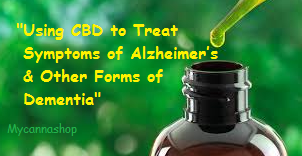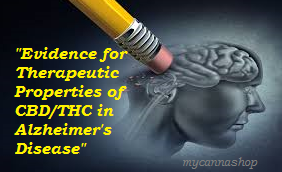Currently, the options for treating BPSD (Behavioral and Psychological Symptoms of Dementia) include pharmacological and nonpharmacological therapies. Psychotropic medications are often used to reduce the frequency and severity of BPSD, but in the majority of patients, they provide only modest symptom control and important side effects.
The interest of cannabinoids in Alzheimer disease and other forms of dementia has increased first as neuroprotective drugs in animal studies. Indeed, some studies suggest a potential beneficial effect of CB1 and CB2 receptor agonists on reducing harmful β-amyloid peptide action and tau phosphorylation seen in Alzheimer disease as well as increasing intrinsic brain repair mechanisms.




